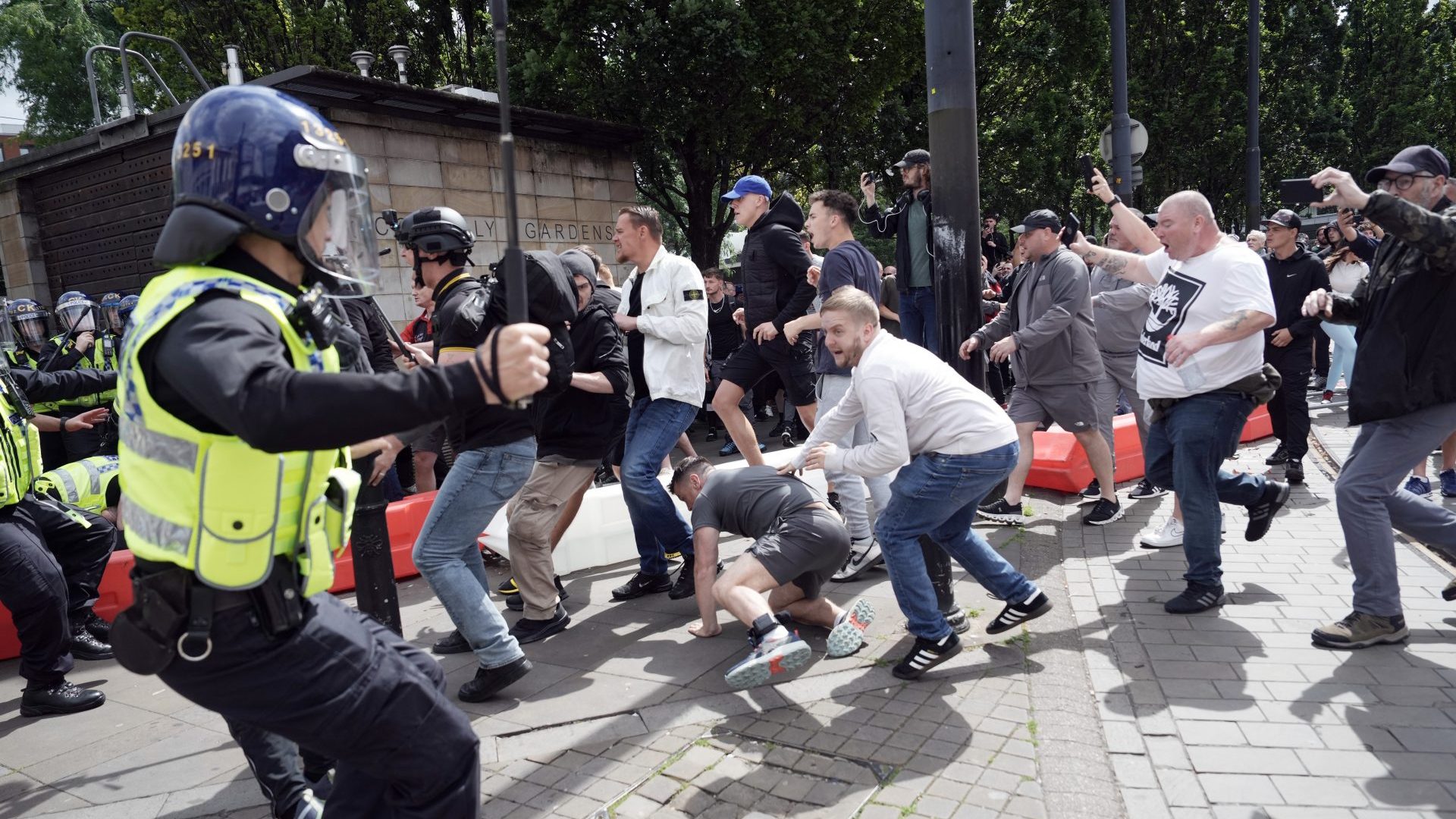The summer will soon be over; a British summer that will always be remembered for the far right riots on the streets.
To see the fascists as they marched was horrifying – but it had one useful side-effect. It revealed something that has become buried under a mound of cheap culture war posturing about migrants, trans people, stopping the boats, the distinction between “somewheres” and “anywheres”, taking back control and everything else.
The vile, drunken, coked-up flurry of red faces and racist violence came along to show us what we were missing all along.
Our problem, Britain’s problem – the west’s problem – is that too many people have forgotten the lessons of 1945. The angry men on our streets with their swastika tattoos were the most extreme expression of that fact.
But nationalism and its attendant beliefs have other subtler and more insidious ways of entering the political bloodstream, and they have been seeping deeper into the British right for years. Now, in Britain, these nationalistic ideas shape the most fundamental and potentially destructive divide in our political culture: between those who feel and think in terms of a rigidly defined and unchanging “nation” and those who do not; between those who can accept difference, and those who cannot; between those who deploy hatred as a political tool, and those who find that tactic repulsive; between those who have forgotten the lessons of the 20th century and those who have not.
To begin this process of forgetting requires a particular psychological shift, a move away from the settled confidence of patriotism, towards a more alarmed, uncertain feeling that the nation is somehow under threat. That’s how it all starts – and immediately there are problems. Because this new instinct brings with it the idea that the nation’s identity, its essence, is in danger and therefore in need of urgent protection.
But what danger? It can take any number of forms – consider, for example, the absurd attempt by the previous Conservative administration to start a confrontation with the National Trust over the written material on display at its country houses. It was a ridiculous episode, but then the nationalist impulse often leads people to do and say ridiculous things.
The argument started when the National Trust began emphasising the links between some of its stately homes and the slave trade, an association regarded as unacceptable by certain members of the previous government, even though those links were matters of historical fact. But the question of truth was irrelevant in this case. More relevant was the paranoiac response of elected politicians, who became convinced that something important was under threat.
And once that idea lodges itself in the political mind, it leads to a much darker question: if the nation is under threat, if it is somehow being twisted out of shape, then someone out there must be doing the twisting. Who?
The three previous Tory prime ministers and their media supporters put the blame firmly on the “woke” phenomenon, which was framed as a threat to Britain but, like so many of the ideas and fixations that pave the way to disaster, one with no clear definition. But that didn’t prevent “woke”, along with that other undefined term “cultural marxism”, from becoming a catch-all phrase to throw at the people who were trying to undermine the nation: who were tearing down statues and dumping them in Bristol harbour, who were trying to abolish gender, who were trying to defund the police, who were taking the knee, who were asking tricky questions about race – all of these things were bundled up in that single, grammatically off-kilter word – woke.
The “woke” term became a way of differentiating between good, worthy, real members of society, and others who are bad, degenerate and somehow phoney. This second group, who according to the Daily Telegraph had become infected by a “woke mind virus”, are deluded, dangerous. For the nationalist, they are the enemy within. They are, to borrow a notorious headline, “Enemies of the people”.
In a democratic system, you can’t get rid of people you regard as dangerous, or degenerate. But if they happen to be foreign or foreign-born, and particularly if they are immigrants, then things become very different. At this point, nationalists can go on the attack, producing alarmist posters that show long lines of refugees, and warning that the nation is at “Breaking Point” due to immigration. They can also create a “hostile environment” for immigrants, and run general election campaigns promising to “stop the boats”.
As the anti-immigrant sentiment becomes even more extreme, nationalist governments can simply lock up foreign people whose presence they regard as not being in the national interest. The last No 10 administration did precisely this, interning refugees on a prison barge called the Bibby Stockholm moored off Portland, on the Dorset coast.
And so a fixation with defending the essence of the nation leads to attacks on the enemy within, an uncompromising attitude towards people who do not belong, and to the horror of extra-judicial political detention. Twenty-first century nationalism has just the same consequences as its 20th-century forebear.
And stirred into this ugly political stew is a foul dose of racism. Antisemitic hate crime is on the increase in Britain. At the same time, a stream of poisonous media commentary and political signalling has merged the issue of immigration with a well-established fear and visceral hatred of Muslims.
Take for example the Tory Party leadership contender Robert Jenrick, who suggested that people who use the Muslim utterance “Allahu Akbar” in public should face arrest. He made no equivalent or even comparable suggestions about any other religions, or any other use of language – his proposal was aimed at Muslims alone.
As for the Islamophobe commentariat, the right wing press contains a host of writers who regard Islam as a threat to Britain. An especially dangerous idea popular on the extreme right is “replacement theory”, the suggestion that white British people will eventually become a minority in a Muslim-dominated Britain, a vision of the future that speaks directly to the paranoid, nationalist fear that the country is somehow in peril.
It is no surprise that the summer riots were triggered by an online rumour that the murder of three children in Southport had been committed by a Muslim immigrant. This turned out to be a lie, but it was a lie that fed directly into a pre-existing morass of immigrant hatred, and the sense that Britain has reached a “breaking point”.
The nationalistic fixation on difference, race and immigration led to violence in the streets. But its political pinnacle was perhaps the Rwanda plan, a project so extreme that it turned out to be illegal under international law. But the very idea of international law – or of any kind of transnational consensus – is unacceptable to the nationalist as it inhibits the nation’s capacity to act, and is therefore a threat to sovereignty. And in a choice between sovereignty and international law, international law has to go.
This led to an attempt by the right wing of the Conservative Party to “save” the Rwanda plan by pulling Britain out of the European Court of Human Rights. That body was set up after the second world war by a consortium of nations, including Britain, that were so horrified by the degradations of conflict that they introduced standards for how civilised societies should behave.
The fact that the Rwanda plan fell short of standards created in the aftermath of 1945 didn’t seem to worry the people who were promoting it. The thing that outraged them was that the inhumanity of their plan was being pointed out by an international body.
This aversion to internationalism was also the guiding instinct behind Brexit, alas. So much has already been written about our departure from the EU, about its causes and its consequences, but in its ideological character, the idea of Brexit was a nationalist fiction to rival any of the great lies of the 20th century. It promised voters that with a single leap Britain could free itself from all constraints, return to its former imperial glory and win the global race.
Even though no such leap has ever been achieved in the history of humankind, a scrum of politicians, intellectuals and commentators from the right were convinced it could be done. Some of them remain convinced that victory is near, and are still saying so in newspaper columns. Like the Soviets who insisted their system would have worked if only it had been done properly, the nationalists who imposed Brexit on Britain will never acknowledge its failure – even as the disaster unfolds around them.
Their response has been to lash out, and the eight years since Brexit have been so politically exhausting because successive governments have spent so long attacking their ideological enemies, many of whom fall outside the world of politics. Somewhere among all this hectoring, the nationalists and Brexit radicals forgot something fundamental: that the nation is there to serve the individual – not the other way round. Individuals are not there to have politics done to them, at least not in a democracy. Neither are they there to be slotted into a picture that matches the aesthetic visions of their political overseers. Leaders who forget this inevitably come up against the problem of people who can not be neatly slotted in.
What do you do with them? Where can you put them? If you can’t put them anywhere, how can you get rid of them? When you reach this final question, as the 20th century showed, you have taken a decisive step into the nightmare.
Britain has stepped back – thank God. For now, at least. Lisa Nandy’s remark that “the era of culture wars is over” came as such a huge relief because it signalled that the government was calling off its fight with the people.
But in a grim irony, the coming of the Labour government was perhaps also a stimulus for the racist riots. When nationalists see their goals slipping further into the distance it is little surprise that the result is rage. The January 6 riot in Washington DC’s Capitol made that all too clear.
That anger comes so easily because the nationalist worldview is essentially instinctual. It is based on feeling, on the sense that of course something is wrong with the country, and of course there’s a threat from migrants, and anyone who can’t see it “just isn’t living in the real world”. And such strong convictions, when rebuked by the ballot box, turn quickly to anger.
Another consequence of adopting a political mindset based mainly on instinct is that those instincts become a substitute for ideas – and it is a characteristic of the nationalists that they offer no real ideas. Between them, Boris Johnson, Liz Truss and Rishi Sunak dealt entirely in the negative. They told us what they did not want – the EU, taxes and HS2 – but nothing about what they did want.
Johnson’s only legacy was the notion of “cakeism”, which is nothing more than a synonym for bullshit. The same is true of Donald Trump, who communicates almost exclusively in terms of political hatred, and who presents no new ideas – nothing, in fact, other than himself. Trump represents many things to many people, but makes no real argument.
The most extreme version of the empty nationalist is Vladimir Putin. As the historian Tim Snyder has pointed out, Putin offers no ideology, no new political system and no ideas. His only interest is power, and his invasion of Ukraine is an expression of that single guiding instinct. Despite the enormity of Putin’s barbaric act of war, despite his torture chambers and his filtration camps, he represents nothing. There is no philosophy underpinning his regime. His explanations for the invasion veer from wanting to fight “Ukrainian Nazis” to rambling, historically illiterate screeds about Greater Russia. But if you look hard enough at Putin, you will see there’s nothing there.
Putin represents an endpoint, the inevitable logical conclusion of nationalism, and though he may have veered into outright fascism, all nationalists are on the same spectrum, even if they don’t like admitting it. It’s why Nigel Farage called Putin the world leader he most admired, remarks he’s since disowned. It’s also why, in response to the recent US-Russia prisoner swap, Trump remarked: “I’d like to congratulate Vladimir Putin for having made yet another great deal”. He made no mention of the man on the other side of that deal, the current US president, Joe Biden.
For liberals watching all this in dismay, a consoling thought is that populist nationalism has a single great central weakness – it doesn’t work. The benefits it promises are entirely abstract: sovereignty, freedom, control, these are campaigning, propaganda words, and often very effective, but they are not governing words. When asked “what are you actually going to do?”, the nationalist invariably has nothing constructive to say. What, really, are Farage’s policies? Trump’s? Putin’s?
Like all nationalists, what they really offer is a chance to repeat the mistakes of the 20th century, to resurrect the old idea that the nation is threatened, and to become a true and worthy version of itself, the country – the people – must confront all threats, all enemies. That political outlook fed into the logic of the Holocaust. It nearly led to the annihilation of western civilisation. Twice.
And yet there are people who believe it now, in Westminster, across the capitals of Europe, in the US, in Moscow and in the streets of England. These people have learned nothing. And they are dangerous.




